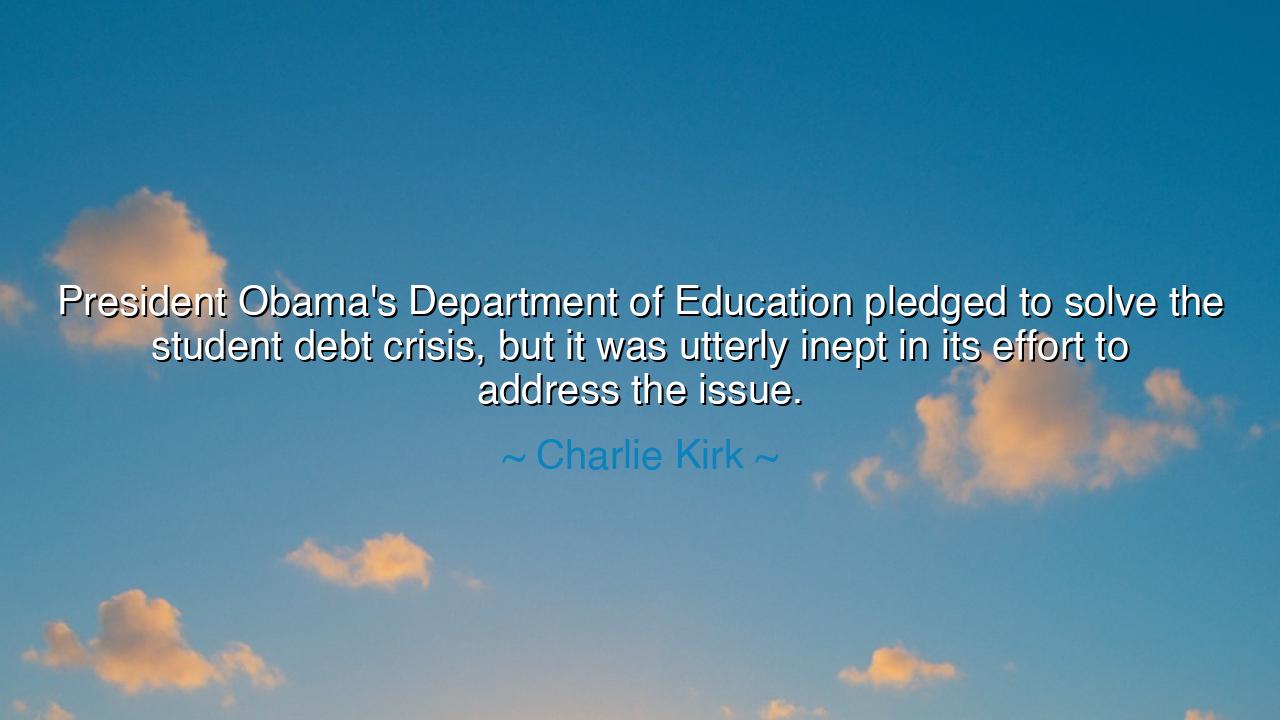
President Obama's Department of Education pledged to solve the
President Obama's Department of Education pledged to solve the student debt crisis, but it was utterly inept in its effort to address the issue.






Hear the words of Charlie Kirk, a voice of sharp critique in the halls of America’s politics: “President Obama’s Department of Education pledged to solve the student debt crisis, but it was utterly inept in its effort to address the issue.” These words do not fall lightly; they strike at the heart of a generation burdened by chains of debt, promised liberation yet delivered little relief. For behind this saying lies a truth as ancient as governance itself: that the pledges of rulers must be measured not by their grandeur, but by the fruit they bear in the lives of the people.
The student debt crisis is no mere policy matter; it is a storm that has swept across millions of young men and women who sought learning but found themselves shackled. Education, which should have been their ladder to opportunity, became for many a weight around their necks. When Obama’s administration pledged to confront this burden, hope rose in the hearts of students and families alike. Yet Kirk, in his criticism, declares that the Department’s attempts were weak, unfocused, or bound by bureaucracy, leaving the people still trapped. Thus, the promise of freedom became another chapter of disillusion.
This is not the first time in history that lofty promises have fallen short. In ancient Rome, emperors often pledged grain to the poor, proclaiming themselves providers of abundance. Yet when corruption or inefficiency rotted the system, the people starved while leaders boasted of their generosity. So too in the modern age: proclamations of reform may be great in sound, yet if they are not joined to wisdom, discipline, and courage, they crumble before the weight of reality.
The heart of Kirk’s critique is not simply against one administration, but against the gap that often yawns between pledge and performance. To promise the people relief and fail to deliver is to weaken trust, and when trust decays, so too does the bond between citizen and state. For the young, who entered adulthood with hope of education as liberation, this failure was especially bitter. Many emerged from universities not free to create, build, and serve, but chained by debts that consumed their strength.
Yet from this failure arises a lesson. If a nation proclaims that education is a public good, it must ensure that its cost does not destroy its value. If a government promises to act, it must act with wisdom and competence, lest cynicism take root in the hearts of its people. And if citizens would see change, they must not place blind faith in leaders alone, but hold them accountable, demanding that noble words be matched by noble deeds.
History also shows what can be achieved when words and action align. After World War II, the United States introduced the G.I. Bill, giving returning soldiers access to education without crushing debt. Millions rose from poverty into the middle class, and the nation itself grew stronger because education was not a trap but a gift. This stands as proof that policy, when just and competent, can transform not only lives but generations.
Therefore, O listener, take this lesson to heart: promises, however radiant, are not enough. Look always to results. If leaders pledge relief from debt, demand proof of their labor. If institutions claim to value education, ensure that it uplifts rather than enslaves. And in your own life, remember that education is sacred—it must never be allowed to become a weapon against those who seek it.
For as Kirk declared, the pledge of Obama’s Department of Education was great in words but weak in deeds. Let this be a reminder: nations are not strengthened by proclamations, but by the faithful fulfillment of promises. To speak of solving crises is easy; to act with wisdom, discipline, and courage is rare. And it is only by the latter that the people may be truly set free.






AAdministratorAdministrator
Welcome, honored guests. Please leave a comment, we will respond soon